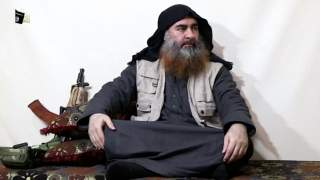Baghdadi's Death Creates an Opportunity for Peace in the Middle East
All signs indicate that various countries in the Arab world are hungry for a diplomatic solution to their rivalry with Iran.
Killing ISIS leader Abu Bakr al-Baghdadi, strangely enough, opens up new possibilities for Middle East peace.
This is not just a triumph of arms but of intelligence, as President Donald Trump recognized. America’s seventeen intelligence agencies are one of the strong pillars of U.S. global leadership. By painstakingly assembling facts, combined with satellite images and varying eyewitness in a half-dozen languages, the silent men and women of the intelligence services have shown their value.
Now the diplomats can play an equally important role. ISIS, even in its wounded and scattered state, presents a threat to Arab lands, Europe, Russia, Turkey, Syria and the United States. It seeks to topple Arab leaders by force and drive out all non-Arabs from the region. If it succeeded, then it would millions of people and have vast oil wealth to underwrite its ambitions. It would be a new superpower. None of the major world powers wants to be challenged by a new nation of suicidal zealots. So, the destruction of ISIS is the one goal that has united Syria, Russia, Turkey and the United States ever since President Barack Obama kickstarted the 2014 initiative with the Syrian Kurds. While each country favors differing factions in the Syrian civil war, ISIS is the common enemy of all.
While far from a formal alliance, these nations share intelligence about ISIS, open-air and ground spaces to each other’s fighters and strain to avoid attacking each other. That this coalition has held together is a victory for U.S. diplomacy.
A new shared objective will soon emerge. The’ scattered remnants of ISIS are expected to join Syria’s Al Qaeda affiliate, which is conveniently run by al-Baghdadi’s former second in command.
Indeed al-Baghdadi’s compound was in Al Qaeda-controlled territory and the two former rivals appear to already be sharing personnel and operating together. Getting this rough, multinational anti-ISIS coalition to coalesce around destroying Al Qaeda in Syria should be eminently doable.
Now is also the time to think even bigger. Consider the possibilities of a grand strategy that includes Israel-Palestine and Iran. The cooperation, born of necessity on the Syrian battlefield, could be extended to include the two most vexing problems in the region.
Iran and Palestine are already linked. Iran funds Hamas, a terror group based in the Gaza Strip, and Hezbollah, a terrorist outfit based in Lebanon that has killed more Americans than any other except Al Qaeda. Both groups attack Israelis and seek the end of Israel’s existence. Any peace with the Palestinians will require Iran to stand down, yet Tehran is not a party to any proposed peace settlement.
The diplomatic efforts of both Obama and Trump could be put to work here. Building on the good work of two U.S. patriots, the architect of Obama’s Iran nuclear deal, Robert Malley, now president of the International Crisis Group and Obama’s undersecretary of State for political affairs, Wendy Sherman, the foundations of the deal could be used as a base for future gains. But the deal would have to be expanded to include ending Iran’s funding of terrorism around the world, ending its support of Hamas and Hezbollah, ending its support of the civil war in Yemen, and supporting human rights and democratic reforms in its own land. A tall order, to be sure. But Iran’s economy is suffering from sanctions, its currency weakened by runaway inflation, and it can longer feed or refine enough oil for its own people. Like the Palestinians, its people need jobs and hope.
Here’s where the Trump administration can supply the missing pieces. Jared Kushner’s “deal of the century” offers a uniquely promising approach, putting economic growth ahead of drawing borders. Jared Kushner has secured some $2 billion in investments from an array of stakeholders. He is betting that the younger generation cares more about housing and feeding their children than lines on a map.
Meanwhile, all signs indicate that various countries in the Arab world are hungry for a diplomatic solution to their rivalry with Iran. The Saudis and Gulf Arabs want to end to terror strikes on their oil infrastructure, which they blame Iran for, and recognize that a calmer Middle East produces price stability in global energy markets. Steady prices reduce Asian, European and North American incentives to seek alternatives to oil while ensuring Arab oil sales for the foreseeable future.
Israel, too, may be ready to set aside former Prime Minister Benjamin Netanyahu’s politics of confrontation with Iran. That approach has reached its natural end. Gen. Benny Gantz is trying to secure a new governing coalition in Jerusalem; he says he is open to a new approach. Jared Kushner is expected to meet him in the coming weeks when he can reinforce the idea of a wide-ranging regional deal for peace.
Even America’s rivals now have strong incentives to favor a regional peace plan. Russia feels drained by its long war in Syria and seeks trade agreements with Egypt and other Arab lands. It wants peace and growth. China wants peace to safeguard its energy investments in Arab East Africa and its oil lifeline from the Middle East while cementing its considerable influence there. That Beijing recently terminated a Central-Asian pipeline project with Iran is another sign of China’s willingness to spurn Iran.
Since all of the region’s major problems are tied together, it may be easier to solve them all at once. And Kushner is already talking to most of the decisionmakers.
Ahmed Charai is a Moroccan publisher. He is on the board of directors for the Atlantic Council, an international counselor of the Center for a Strategic and International Studies, and a member of the Advisory Board of The Center for the National Interest in Washington and the Advisory Board of Gatestone Institute in New York.
Image: Reuters

